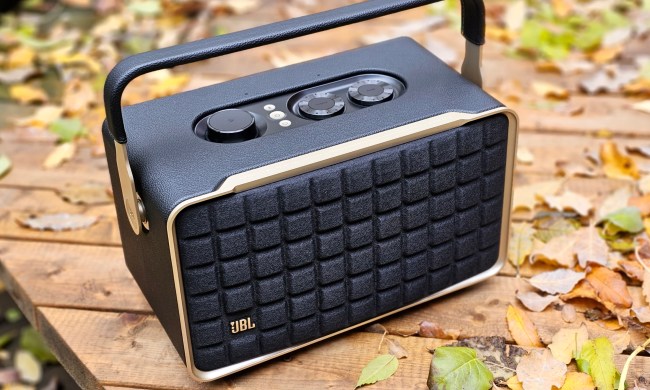- Brilliant touchscreen user interface; brighter display with double the resolution of the original
- Expensive; relatively short battery life
Summary
If you already own a Sonos Digital Music System, you’d better not pick up the brand-new controller unless you intend to buy one. The original touch-wheel controller is wonderful; the touchscreen model is absolutely irresistible.
If you’re not already familiar with Sonos’ innovative multi-room audio system, you can read our review here. Sonos is now shipping the new model CR200 controller with all its bundled products, but it can be easily added to any existing setup. And thanks to the way the Sonos wireless network is designed, it’s possible to use multiple remotes, including the older model CR100 or an iPhone running Sonos’ free app.
Features and Performance
The CR200’s screen looks much larger than the CR100’s, but it’s an illusion: Both models have 3.5-inch displays, but the monitor on the new model is much brighter and it boasts twice the resolution (640×480 pixels, compared to the CR100’s 240×320 pixels). The new controller’s housing is also much smaller— measuring 4.5 inches high by 2.9 inches wide—which further contributes to the perception that it has a larger screen (the original measures 3.82 inches high by 6.5 inches wide). The device is fabricated from anodized aluminum with a rubber backing that makes it easy to grip. The dimensions, weight, and touchscreen render the CR200 much easier to use with one hand than the original controller is.

The main music menu provides access to just about every aspect of the system, including your music library, Internet radio, and whatever online music services you subscribe to. Tap the Music Library button and you can view the contents of the music stored on your PC, server, or NAS box sorted by artist, album, track, genre, and more. Sliding your finger up and down the screen to scrolls through the list of choices. Flicking your finger up or down scrolls more quickly; there’s also a speed-scroll feature on the right side of index pages with lots of entries, such as the artist and album title lists. Sliding your finger up and down here displays a large capital letter in the middle of the screen. Lift your finger when the letter you want appears, and the index will jump to content beginning with that letter. The on-screen keyboard makes it very easy to perform in-depth searches for artists or specific albums, but we’ve found the only time we make much use of this feature is when we’re listening to music-subscription services, such as Rhapsody and Napster.

Battery Life and Conclusion
The new controller starts up much faster than the original, but it also consumes battery power much quicker. Sonos claims two to five days of battery life, but we got just one day’s use out of our evaluation unit before we had to put it back on its cradle for recharging. The cradle, by the way, is included in the price of the new controller (it’s a $40 option on the CR100). Sonos also sells standalone cradles for $39.99 each, should you wish to place a charger in more than one room in your house. Unlike the original model, the CR200 has a removable battery.

The CR200’s $349 price tag renders it an expensive upgrade; after all, you could bring music to another room in your home by adding a non-amplified Zone Player for the same amount of money (plus the cost of powered speakers). And people who own iPhones might forgo the new controller altogether, since the free Sonos app delivers the same functionality from the hardware they already own. But none of this detracts from the new controller’s utter brilliance. Yes, folks, Sonos has done it again.
Pros:
- Highly responsive touchscreen
- Brighter and double the resolution of the CR100 controller
- Awesome accessory for online music services like LastFM and Rhapsody
Cons:
- Expensive
- Short battery life



